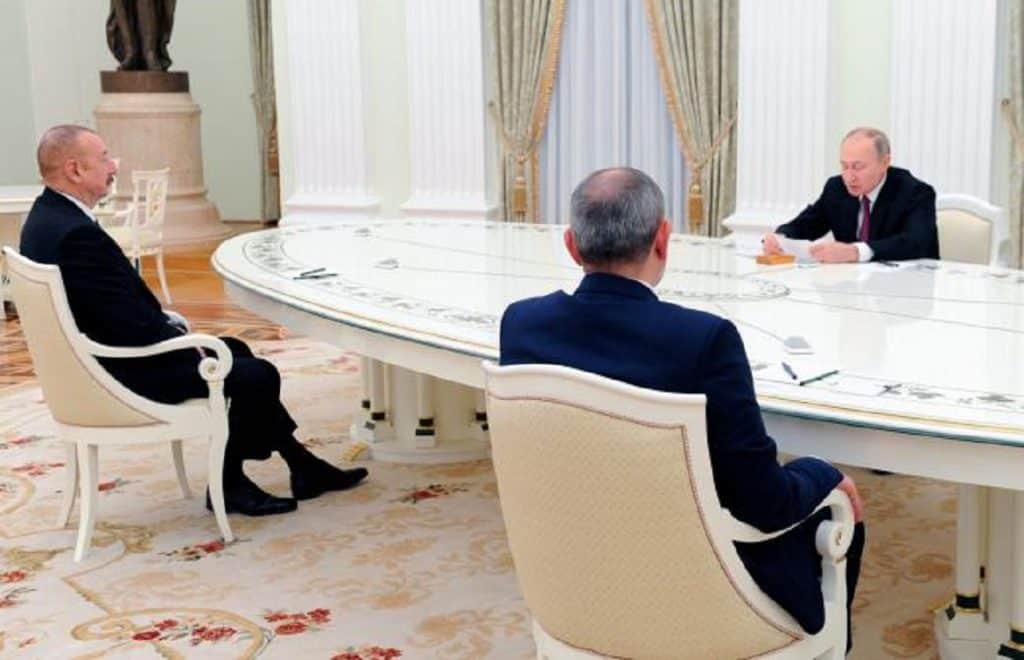By Nikola Mikovic
Russia is struggling to preserve the Caucasus in its geopolitical orbit, while Turkey’s influence in the region continues to grow. Moscow keeps acting as a mediator in the Armenia – Azerbaijan dispute over Nagorno-Karabakh, months after the Ankara-backed Azeri army effectively won the war against Yerevan-sponsored forces in the mountainous province located near the crucial gas and oil pipelines.

On January 11 in Moscow, Russian President Vladimir Putin sat down for talks with Azerbaijani President Ilham Aliyev and Armenian Prime Minister Nikol Pashinyan to discuss the implementation of the Russia-brokered peace deal that ended the 44 day war between the Azeri army and Armenian forces in November last year. According to Putin, the peace agreement has “created the necessary basis for a long-term and full-format settlement of the old conflict”.
It is worth noting that, a day before the summit with Aliyev and Pashinyan, Putin spoke with French President Emmanuel Macron about his upcoming meeting with the leaders of Azerbaijan and Armenia. France is traditionally sympathetic to Armenians, while the Kremlin is traditionally sympathetic to gas and oil pipelines. Armenians, unlike Azerbaijan, have none, which could be the main reason why Moscow failed to provide assistance to its nominal ally during the conflict last year.
Reports suggest that unblocking of all economic and transport links in the region, as well as construction of the rail and road links, are put forward as priorities.
“I will not hide the fact that the implementation of today’s statement can simply change the economic image and appearance of our region, and economic innovations can lead to even more reliable guarantees of security in the region”, said Pashinyan who is seen as a “traitor” by many Armenians since he signed a de facto capitulation.
Ara Abramyan, President of the Union of Armenians of Russia, published an open letter to the Armenian Prime Minister claiming that Pashinyan “can no longer represent Armenians and sign any documents on behalf of Armenia”. Russia, however, continues to publicly support Pashinyan, as he has yet to take responsibility for border demarcation, which will also not be in Armenia’s favor.
Azerbaijan’s leader, on the other hand, said that, as a result of their talks, Armenia will have a railway connection with Russia through Azerbaijan. In exchange for such a rail link, Armenia undertakes to ensure a stable rail connection between Azerbaijan mainland and its exclave of Nakhchivan through Armenian territory. As a result of the November 9 peace deal, around 2,000 Russian peacekeepers have been deployed along frontline areas and to protect a land link connecting Nagorno-Karabakh with Armenia. The truce agreement also envisages a Russian-guarded transport corridor running through southern Armenia to connect Azerbaijan to Nakhchivan, and thereby to its regional ally Turkey.
According to some reports, Turkey continues the transfer of military equipment and troops to Azerbaijan, which raises concerns in Armenia that Ankara is apparently preparing to open three military bases in Azerbaijan. One would be located near the city of Ganja, and it would serve as an observation point to cover various activities in neighboring Armenia and Georgia. Second base would be built in the town of Gabala, near the Russian border, where the Soviet Union once had a major radar station. Finally, the third base would be in Lankaran, in the south of Azerbaijan on the Caspian coast, which is close to Iran. Besides Armenia, the Islamic Republic is seen as the biggest loser of this conflict, since Azerbaijan has developed strong ties not only with its Tehran’s rival Turkey, but also with its archenemy Israel. Still, from the Iranian perspective, Azerbaijan hosting Turkish bases is lesser than two evils if the alternative was establishing Israeli military facilities in the country.
Although Russia is seen as the main winner of the Nagorno-Karabakh war, since Moscow now has its troops stationed in the region, just a month after the Russian peacekeepers arrived to Nagorno-Karabakh some influential US experts are already looking for a way to get rid of the Russian forces once their mandate expires in 2025. Indeed, such ideas are part of an ongoing global struggle for the Transcaucasian sphere of influence. Still, there are fears in the West that Russian soldiers in Nagorno-Karabakh are there to stay for the foreseeable future, especially given the presence of Russian peacekeepers in Moldova’s breakaway region of Transnistria since 1992.
Indeed, in the long term, the main beneficiaries of the peace deal will likely be foreign actors, rather than Armenia and Azerbaijan. New transport links in the region aim to strengthen Russian and Turkish influences in the energy-rich Caucasus. A railway linking Armenia with Russia would significantly increase Moscow’s position in the country, since the Russian goods will have a notable advantage on goods of other countries due to lower transport costs, given Armenia’s membership in the Kremlin-led Eurasian Union. At the same time, the Nakchivan corridor could potentially give Turkey another tool to anchor its influence in the Caspian region that has traditionally been dominated by Russia.
Author: Nikola Mikovic (Journalist, researcher and analyst based in Serbia. He covers mostly the foreign policies of Russia, Belarus and Ukraine)
(The views expressed in this article belong only to the author and do not necessarily reflect the views of World Geostrategic Insights).







